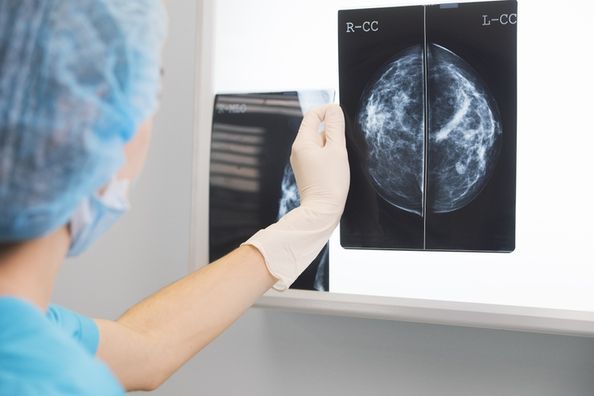“I was scared, but I knew it had to be done.”
Those words encapsulate how many women feel the first time they are screened or tested to determine their risk level for developing breast cancer. For Christine Palmisano, a working mom of three daughters, the results of her oncologic genetic testing were both the wake-up call and signal she needed to start the important process of high-risk breast cancer treatment with Duly.
According to the American Cancer Society, one in eight women will be diagnosed with breast cancer at some point in their lifetime. While the biggest risk factors of developing breast cancer remain age and gender, other factors can also increase an individual’s risk, including genetic makeup, personal/family history, dense breast tissue and more. If a patient is at high risk for breast cancer, taking advantage of certain medical options may detect cancer at an earlier stage or decrease her risk for development of breast cancer.
Palmisano’s process started with a simple recommendation to undergo genetic testing from her cousin, an ovarian cancer survivor who was diagnosed early and able to combat her condition. In fact, it was that same cousin who effectively initiated all the women in her family to get tested. In both instances, Palmisano and her cousin tested positive for the specific BRCA2 gene, which increases the likelihood of cancer in the ovaries as well as the breast.
“Once I knew my cousin had tested positive, and my own sister came back negative, I basically knew then I should brace myself for a positive result for the BRCA gene,” recalls Palmisano. “I decided to go to my primary care doctor and my gynecologist to share my family history and determine the next steps. They immediately recommended I visit the High Risk Breast Clinic. I was very impressed with my experience there.”
At Duly’s High Risk Breast Clinic, an on-staff genetic counselor assists patients with the initial screening and testing process. At a patient’s first appointment, they complete a detailed questionnaire about their personal and family health history and receive a physical exam by a breast surgeon. The clinic team then works with the patient to suggest a comprehensive care plan that is specific to their needs.
The team at our High Risk Breast Clinic provides comprehensive breast cancer screening, genetic risk evaluation and counseling for patients if they are at increased risk of breast cancer.
An initial High Risk Breast Clinic visit will last approximately one hour and include a clinical breast exam, review of personal medical and family history, and will also evaluate the overall level of risk, followed by making risk-reducing strategies available. In addition, patients will be informed of research studies they may qualify for, along with detailed information about other support and services available.
For Palmisano, her treatment program at Duly’s High-Risk Breast Clinic culminated in the decision to undergo a double mastectomy, to combat the risks she faced after testing positive for the BRCA gene. She feels the decision was an autonomous one-an opportunity for which she is grateful to her entire care team at Duly.
“Dr. Amrit Mangat called me herself to deliver the results of my test and later during my consultation she presented all the options, and let me make the decision on which course of treatment was right for me,” says Palmisano. “She was always uplifting and very positive about the whole thing. I didn’t have a doubt that she was the right doctor for me.”
As part of its overall dedication to women’s health, Duly Health and Care works to treat and raise awareness of breast cancer with patients year round and, as a result, is a leader in providing breast health care to patients in the region. The radiology services, along with the team of physicians, which includes breast surgeons, medical oncologists, radiation oncologists, plastic surgeons and physical therapists, underline DMG’s commitment to patient wellness, from screening and diagnosis to treatment and survivorship. Breast cancer is not something that should only be thought of during the month of October, but throughout the year as an ongoing health mission.
To learn more about overall treatment options, visit the Duly High Risk Breast Clinic or call 630−545−7659 to make an appointment.
Health Topics:

